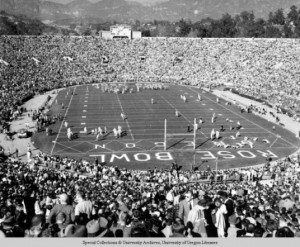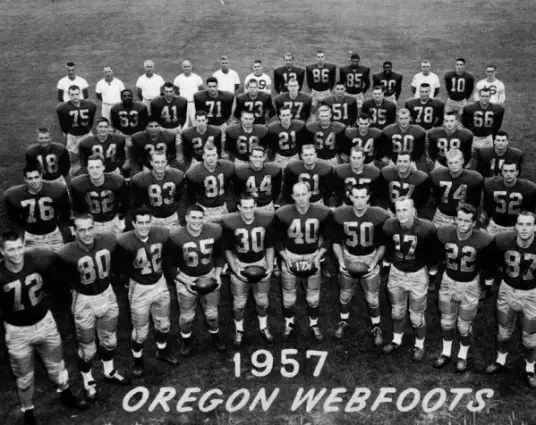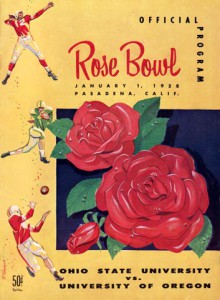Oregon opened 1958 with a close loss to Ohio State in the Rose Bowl game. That game would be the final game for 11 seniors, including the entire starting backfield and most of the top offensive skill players.
The 1958 season opened with a 27-0 shutout of Idaho. That shutout was the first of four shutouts by Oregon’s defense. Other victims would include USC, Stanford, and Oregon State. The flip side of Oregon’s defensive dominance would be the inconsistency of the offense. Oregon would be shutout four times by Oklahoma, Washington, Washington State, and Miami. Additionally, Oregon would lose 7-3 to UCLA, and 23-6 to California. California would end up playing its last Rose Bowl game in 1959.
It was Oregon’s final game of the season that highlighted its dominant defense as well as its inconsistent offense. On December 6, 1958, Oregon met the Miami Hurricanes in Miami. The weather was sunny with a temperature of 82 degrees, something the Ducks were not use to in December. A crowd of 22,898 gathered to watch the game, and this would be the only Oregon game televised during the season, being carried by NBC nationally.
Oregon was favored to beat a Miami team that had a record of 1-8 coming into the game. Miami’s roster certainly was not lacking in talent as it featured a number of players who would go on to professional playing or coaching careers, including Fran Curci, Jim Otto, Jack Novak, Charlie Diamond, and Walt Corey.
This was a game of missed opportunities for Oregon. Oregon opened the game with a kick return by Dave Grosz to Oregon’s 42. Grosz then dropped back to pass on first down. He found Alden Kimbrough wide open at Miami’s 30-yard line. Unfortunately, Grosz’s pass was overthrown and Oregon turned the ball over on downs. Later in the first quarter, Oregon moved the ball to Miami’s 18-yard line. Paul Grover had come into the game for Grosz, and ran an option play on first down. Grover kept the ball and ran off tackle to the end zone for an apparent touchdown. The officials, however, determined that one of the Ducks had held on the play, nullifying the score. Oregon was moved back to Miami’s 29-yard line and eventually turned the ball over on downs.
Oregon’s next opportunity to score would come late in the second quarter. The Ducks mounted a drive from their own 16-yard line to Miami’s 24-yard line. Grosz then attempted a pass to Kimbough at Miami’s 10-yard line. Miami’s Larry Digammarino stepped in front of Kimbrough to intercept the pass. It would be the first of four interceptions thrown by Oregon and the first of three passes picked off by Digammarino.
Next, Miami would get on the scoreboard with the only points of the game. Miami’s “scoring drive” began with a Fran Curci punt from Oregon’s 40-yard line that was downed at the Oregon 1-yard line. The Ducks took possession. On first down, Grosz moved the ball out to the 2-yard line. The next play Oregon’s line jumped offside. In the ensuing confusion, Grosz was sacked in the end zone by Miami’s Dick Poole and Dan Coughlin for a safety. These would prove to be the only points scored in the game. They were surrendered by the offense, not the defense. Ultimately, the Duck defense pitched a fifth shutout.
Oregon certainly was not out of the game at this point. Still in the third quarter, Oregon drove the ball from its own 43-yard line to the Miami 7-yard line after Grosz had recovered an attempted lateral by Curci. This drive, unfortunately would end on first down with a fumble by Len Read.
Still in the third quarter, Willie West returned a punt for 43 yards setting Oregon up on Miami’s 25-yard line. Grover passed to Kimbrough at the Miami 10-yard line and a first down. On the next two plays Grover ran the ball to the 7-yard line. It is now third and goal to go. Grover pitched the ball out to Dave Grayson who ran to his right. As he neared the line of scrimmage, Grayson spotted West in the end zone. Grayson, as he was hit, tossed the ball to West, who making a diving catch, secured the ball in the end zone. One official signaled touchdown. However, another official threw a flag claiming Grayson was over the line of scrimmage when he threw the pass, nullifying the touchdown. After a heated debate in which Oregon players attempted to show how Grayson was still behind the line when he threw the pass, the Referee ruled against Oregon. Of note is that fact that all of the officials were from the ACC or SEC. There also was no instant replay in that era. The Ducks were assessed a penalty, including loss of down, and moved back to the Miami 12-yard line. It was now fourth and eight. Len Casanova then elected to go for the field goal. Oregon’s placekicker, John Clarke, was sent into the game. Clarke’s kick sailed wide left.
That was essentially the end of Oregon’s opportunities to score. Miami played a nice game defensively aided by six Oregon turnovers.
As a result of the offense surrendering a safety, Oklahoma would conclude the season with the best scoring defense. Oklahoma with a record of 10-1 and ranked fifth, surrendered 49 points over 10 games, including its 6-0 win over Oregon. The Ducks gave up 50 points over 10 games to finish second in that category. LSU, the national champion, would finish third with 53 points.
While the 1958 season was a frustrating one, it featured one of the great defenses in Oregon history. Willie West, Bob Grottkau, and Bob Peterson, with his 17 tackles against Miami, were named first team All-Pacific Coast conference. Jim Linden was named second team, and Alden Kimbrough, Pete Welch, Darrell Aschbacher, and Charlie tourville were named honorable mention.
The stage was now set for Oregon’s first season as an independent, an under appreciated 1959 season.
Related Articles:
Jim currently resides in Ellensburg, Washington where he has had the opportunity to watch former Ducks such as NaDerris Ward and Scott Grady play for Central Washington University, Jim’s alma mater. However, Jim was born in Eugene and attended Howard Elementary School, and what then called Colin Kelly Junior High School before moving to Washington. Jim began following the Ducks during the 1957 season and had the opportunity to watch a number of games at Hayward Field. Over the years, Jim has developed a wealth of knowledge about Oregon sports history. When not editing on Fanbase.com or working in his garden, Jim manages to find time to practice law.


